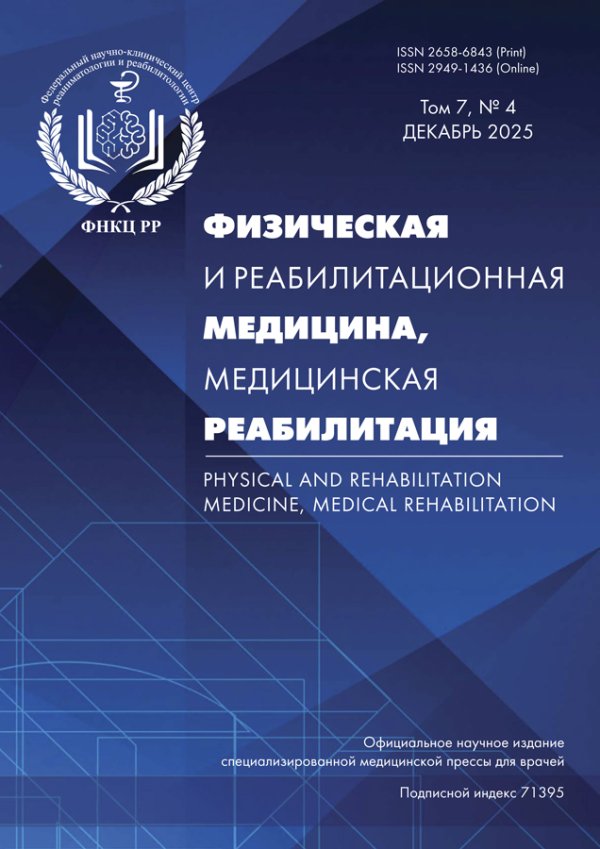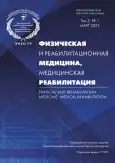The course of post intensive care syndrome in patients with severe cerebral insufficiency and predictors of recovery. Clinical observation
- Authors: Karpova O.V.1, Kruglyakov N.M.1, Zhalnina N.D.1, Eroshkin K.E.1
-
Affiliations:
- Burnasyan Federal Medical Biophysical Center
- Issue: Vol 5, No 1 (2023)
- Pages: 80-92
- Section: CASE REPORT
- URL: https://bakhtiniada.ru/2658-6843/article/view/132846
- DOI: https://doi.org/10.36425/rehab139207
- ID: 132846
Cite item
Full Text
Abstract
Post-intensive care syndrome (PICS) is currently a problem affecting the entire intensive care strategy. The study of its mechanisms becomes most relevant in regard to the prevention of its development and influence on the disease course in patients with impaired respiratory function, neuromuscular transmission and cognitive disorders requiring long-term protection of the vital functions. The severity of the systemic inflammatory response as an individual reaction of the body has a significant influence on the PICS development and severity, that predetermines the degree of neurological and psychological deficiency. The presence of background somatic diseases, such as diabetes mellitus (including that in the framework of metabolic syndrome), significantly aggravates the course of PICS and contributes to the deceleration of the recovery process. The earliest possible start of rehabilitation with both passive and active measures on the basis of an intensive care unit, followed by an expanded individual rehabilitation program on the basis of a specialized department, leads to the most favorable prognosis for the restoration of both impaired vital functions and for the emerging disorders in the cognitive, motor, and affective spheres. Such an approach reduces the length of stay in the hospital and improves the patient’s quality of life after the discharge from the hospital.
The article describes three clinical cases of PIT syndrome. Based on the analysis of the course and severity of this syndrome, the conclusions are drawn about the relationship between the course of the inflammatory process and its effect on the restoration of the impaired functions.
Full Text
##article.viewOnOriginalSite##About the authors
Olga V. Karpova
Burnasyan Federal Medical Biophysical Center
Email: okarpova@fmbcfmba.ru
ORCID iD: 0000-0002-9466-219X
SPIN-code: 7818-8525
MD, Cand. Sci. (Med.)
Russian Federation, 46 Zhivopisnaya st., 123182 MoscowNikolay M. Kruglyakov
Burnasyan Federal Medical Biophysical Center
Email: nik160@mail.ru
ORCID iD: 0000-0001-5011-6288
SPIN-code: 5763-0498
Russian Federation, 46 Zhivopisnaya st., 123182 Moscow
Natalia D. Zhalnina
Burnasyan Federal Medical Biophysical Center
Email: dr.natalia0994@mail.ru
ORCID iD: 0000-0002-3050-3675
Russian Federation, 46 Zhivopisnaya st., 123182 Moscow
Kirill E. Eroshkin
Burnasyan Federal Medical Biophysical Center
Author for correspondence.
Email: erosh.kir@gmail.com
ORCID iD: 0000-0002-6903-9996
Russian Federation, 46 Zhivopisnaya st., 123182 Moscow
References
- Belkin AA. Syndrome of consequences of intensive therapy (PIT syndrome). Alexander Saltanov intensive care herald. 2018;(2):12–23. (In Russ). doi: 10.21320/1818-474X-2018-2-12-23
- Kosinski S, Mohammad RA, Pitcher M, et al. What is post-intensive care syndrome (PICS)? Am J Respir Crit Care Med. 2020;201(8):15–16. doi: 10.1164/rccm.2018P15
- Inoue S, Hatakeyama J, Kondo Y, et al. Post-intensive care syndrome: Its pathophysiology, prevention, and future directions. Acute Med Surg. 2019;6(3):233–246. doi: 10.1002/ams2.415
- Belkin AA, Davyidova NS, Leyderman IN, et al. Clinical recommendations. Anesthesiology and intensive care. Ed. by I.B. Zabolotskih, E.M. Shifman. Moscow: GEOTAR-Media; 2016. Р. 833–858. (In Russ).
- Belkin AA, Alasheev AM, Belkin VA, et al. Rehabilitation in the intensive care unit (RehabICU). Clinical practice recommendations of the national Union of Physical and Rehabilitation Medicine Specialists of Russia and of the national Federation of Anesthesiologists and Reanimatologists: guidelines. Alexander Saltanov intensive care herald. 2022;(2):7–40. (In Russ). doi: 10.21320/1818-474X-2022-2-7-40
- Belkin AA, Alasheev AM, Davyidova NS, et al. Justification of resuscitation rehabilitation in the prevention and treatment of the syndrome “after intensive care” PIT syndrome. Bulletin Restorative Med. 2014;(1):37–43. (In Russ).
- Belkin AA, Davyidova NS, Leyderman IN, et al. Bed-rest mode in intensive care and intensive care. Alexander Saltanov intensive care herald. 2014;(8):15–21. (In Russ).
- Farshatov RS. Chronic critical condition--a new concept or an old problem? Problems of modern science and education. 2015;(5):32. (In Russ). doi: 10.17513/spno.21585
- Hilton J. The classic: On rest and pain: Lecture XIV. Clin Orthop Relat Res. 2009;467(9):2208–2214. doi: 10.1007/s11999-009-0928-1
- Myers EA, Smith DA, Allen SR, Kaplan LJ. Post-ICU syndrome: Rescuing the undiagnosed. JAAPA. 2016;29(4):34–37. doi: 10.1097/01.JAA.0000481401.21841.32
- Convertino VA. Cardiovascular consequences of bed rest: Effect on maximal oxygen uptake. Med Sci Sports Exerc. 1997;29(2): 191–196. doi: 10.1097/00005768-199702000-00005
- Rawal G, Yadav S, Kumar R. Post-intensive care syndrome: An overview. J Transl Int Med. 2017;5(2):90–92. doi: 10.1515/jtim-2016-0016
- Alasheev AM, Belkin AA, Davyidova NS. Polyneuropathy of critical conditions. Methodical manual. Ekaterinburg: Ural State Medical University; 2013. 35 р. (In Russ).
- Belkin AA, Alasheev AM, Davydova NS, et al. Gravity gradient in bed-rest mode in patients with acute cerebral insufficiency. Bulletin Ural Med Academic Sci. 2015;(1):22–28. (In Russ).
- Belkin AA. The somnological aspects of the patient’s stay in the resuscitation and intensive care unit. Consilium Medicum. 2017; 19(2-3):34–37. (In Russ).
- Smith S, Rahman O. Post intensive care syndrome. In: StatPearls. Treasure Island (FL): StatPearls Publishing; 2022.
- Davydov NR, Vinogradov OI, Gorokhovatsky YI, Kuznetsov AN. Polyneuropathy of critical conditions: Causes, diagnostics, approaches to treatment and prevention. Neurological J. 2016;21(1):48–55. doi: 10.18821/1560-9545-2016-21-1-48-55
- Alasheev AM, Belkin AA. Neuromuscular disorders. In: National Guidelines for Intensive Care. Vol. 1. Moscow: GEOTAR-Media; 2009. Р. 357–360. (In Russ).
Supplementary files








